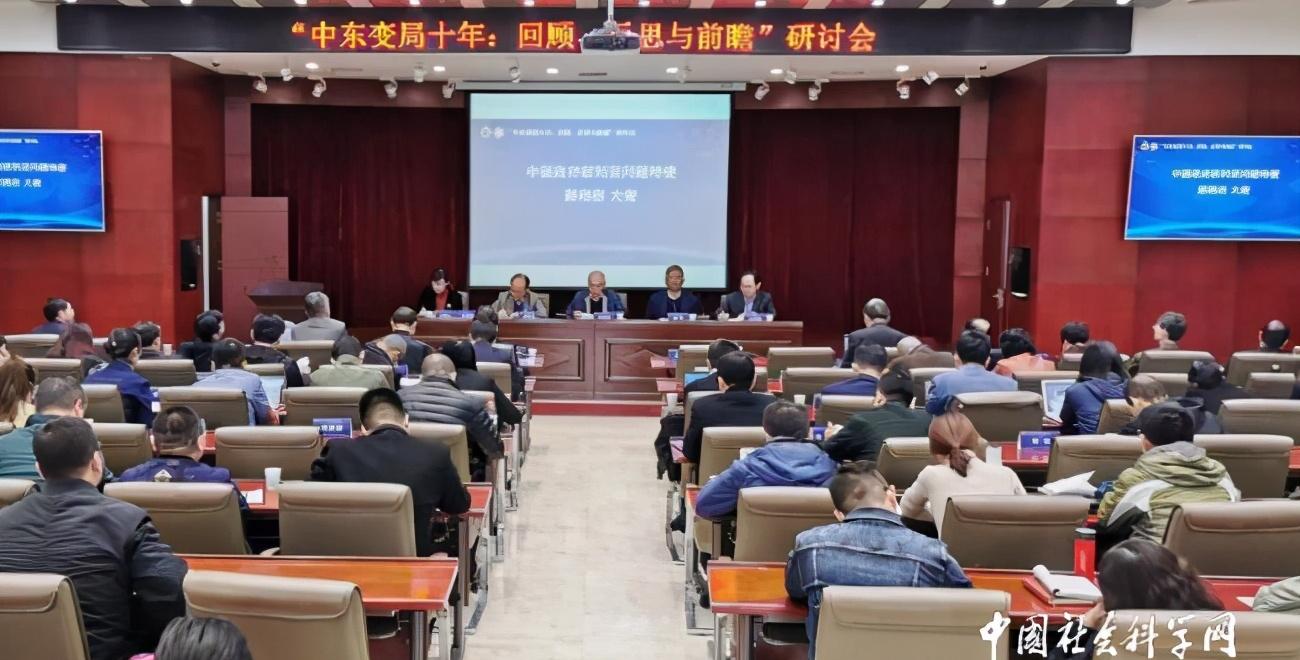On November 7th, the Academic Seminar on "Ten Years of Change in the Middle East: Review, Reflection and Prospect" jointly sponsored by the Editorial Department of West Asia and Africa of the Chinese Academy of Social Sciences, the Middle East Research Institute of Northwest University, the Center for Syrian Studies and the Institute of Regional Countries and Translations was held in Xi'an, with the participation of the Ministry of Foreign Affairs, the Chinese Academy of Social Sciences, the China Academy of International Studies, the China Institute of Contemporary International Relations, the Shanghai Institute of International Studies, Tsinghua University, Fudan University, Sun Yat-sen University, Nankai University, Shanghai University of Foreign Chinese, Yunnan University, More than 80 experts and scholars from dozens of universities and scientific research institutions, including Northwest A&F University, Southwest University, Shaanxi Normal University, University of International Business and Economics, Ningxia University, Tianjin Normal University, Zhejiang Normal University, Shanxi Normal University, Xi'an University of Foreign Chinese, Sichuan University of Foreign Chinese, Zhejiang Chinese College, Henan University of Science and Technology, Inner Mongolia University for Nationalities, northwest university, etc., attended the meeting. Professor Chang Jiang, Vice President of Northwest University, and Wang Lincong, Deputy Director of the Institute of West Asian and African Studies of the Chinese Academy of Social Sciences, delivered speeches successively, and Professor Wang Xingang, Director of the Center for Syrian Studies at Northwest University and Dean of the Institute of Regional Countries and Translation, presided over the opening ceremony.

Meeting scene Zhao Lifan/Photo
During the keynote speech, Ambassador Wu Sike, former special envoy of the Chinese Government for the Middle East, said in his speech that in the face of the complicated situation in the Middle East, China adheres to the diplomatic concept of promoting stability and peace through development and calmly faces the development and changes of the situation. Ambassador Xie Xiaoyan, special envoy of the Chinese government for Syria, analyzed the challenges faced by the Middle East since the "Arab Spring" such as refugees, terrorism, economic transformation and rapid population growth, believed that the Middle East is still an important source of energy and a strategic point for land and sea, and pointed out that China should actively innovate the practice of diplomatic theory in the Middle East. Yang Guang, president of the China Middle East Society and dean of the Institute of Regional Country Studies at Tsinghua University, used Turkey, Egypt and Saudi Arabia as examples to analyze the economic growth of Middle Eastern countries since the drastic changes in the Middle East, and believed that one of the ways out for the economic development of the Middle East is to carry out market-oriented reforms and the other to develop non-oil industries. Wang Lincong analyzed the "long wave" of drastic changes in the Middle East and the dilemma of governance, and believed that the new scientific and technological revolution, economic transformation, and governance capabilities and levels are the core elements of whether Middle Eastern countries can withstand regional and national turmoil in the future.
In his keynote speech, Professor Huang Minxing of the Institute of Middle East Studies of Northwest University analyzed the role and influence of Islam in different historical periods of the construction of the nation-state in the Middle East, and believed that the construction of the nation-state in the Middle East should follow the path of combining its own historical and cultural traditions with the concept of modern nation-state. Li Weijian, a researcher at the Shanghai Institute of International Studies, put forward several thoughts on the current security situation in the Middle East and China's participation in security governance in the Middle East, believing that changes in the external environment and internal development problems are the root causes of turmoil in the Middle East, and China's participation in Middle East security governance should put the promotion of development in the first place. Professor Ha Quan'an of the Institute of European Civilization of Tianjin Normal University analyzed the war on terror and the tide of refugees in the Middle East from the perspective of historical experience and the theory of civilizational exchanges. Professor Liu Zhongmin of the Institute of Middle East Studies at Shanghai Chinese University used security theory as an analytical tool to explain the sectarian problems in current Saudi diplomacy. Professor Ma Xiaolin, dean of the Institute of Mediterranean Studies at Zhejiang Chinese College, discussed how to dialectically view the new round of normalization of Arab-Israeli relations from the perspectives of legitimacy and rationality, limitations and risks, and held that the current cold peace in the Middle East is not real peace, the Arab League has disintegrated, and there is a possibility of repeated changes in "cold" and "hot" in Future Arab-Israeli relations.
The conference set up three panel discussions, the third of which was the Postgraduate Forum. The first panel focused on the new geopolitical situation in the Middle East, the political transformation of Middle Eastern countries and foreign relations. The second panel focused on social and economic governance in the Middle East and the changes in the Middle East and China's correspondence. The third panel of postgraduate forum discussion topics covered the responsibility to protect in the Middle East, Saudi state governance, Egyptian security, Algerian social movements, and the study of Iranian history.
In recent years, more and more Chinese scholars have begun to pay attention to regional and country studies. Professor Han Zhibin, director of the Middle East Research Institute of Northwest University, believes that regional and country studies are of great practical significance for promoting the construction of the "Belt and Road", building a major country diplomacy pattern with Chinese characteristics, and promoting the process of all-round reform and opening up.
Source: China Social Science Network Author: Lu Hang Zhao Lifan
For more academic information, please pay attention to the official WeChat public account of China Social Science Network cssn_cn